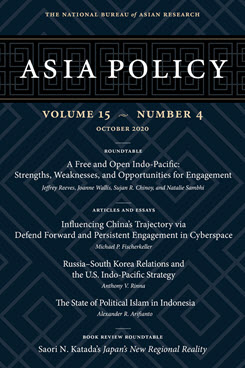Canada and the Free and Open Indo-Pacific
A Strategic Assessment
This essay assesses the strategic implications for Canada of the “free and open Indo-Pacific” (FOIP) vision and argues that, so long as the concept remains exclusionary, Canada can best achieve its national interests through not adopting this construct.
EXECUTIVE SUMMARY
MAIN ARGUMENT
With the region’s democratic powers lining up behind the ideal of a free and open Indo-Pacific, Canada faces growing pressure to self-identify as a FOIP proponent state. Yet its rationale for alignment with this vision is not clear. Canada lacks a material presence in the Indian Ocean region necessitating an Indo-Pacific geographic redesign. Further, it stands to gain little through normative alignment with an Indo-Pacific vision predicated on exclusion or containment of China in Asia. Neither does Canada need to align with any FOIP concept to deepen its ties with Australia, India, Japan, or the U.S., all countries with which Canada already has extensive economic, security, and societal ties. Rather, Canada should consolidate and further develop its relations with small and middle powers in the Asia-Pacific. Specifically, its involvement with Latin American states and its participation in institutions like the Comprehensive and Progressive Agreement for Trans-Pacific Partnership present Canada with unrealized opportunity.
POLICY IMPLICATIONS
- Canada must proactively develop an approach to the Asia-Pacific that allows it to achieve its national interests, including expanded state relations, deepened economic engagement, and increased national prestige.
- In rejecting the FOIP constructs, Canada must identify alternative means to engage with Australia, India, Japan, and the U.S.
- Canada will retain its ability to engage with China—a key strategic partner—by remaining outside the FOIP construct.
Jeffrey Reeves is Vice-President of Research for the Asia Pacific Foundation of Canada (Canada). He previously was the Director of Asian Studies at the U.S. Army War College in Carlisle, Pennsylvania.
About Asia Policy
Asia Policy is a peer-reviewed scholarly journal presenting policy-relevant academic research on the Asia-Pacific that draws clear and concise conclusions useful to today’s policymakers. Asia Policy is published quarterly in January, April, July, and October and accepts submissions on a rolling basis. Learn more


